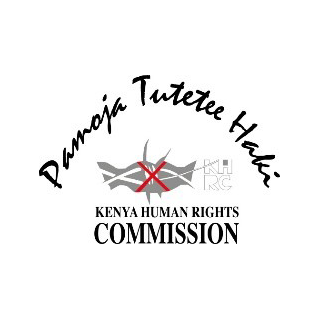About
Kenya Human Rights Commission

|
|
Gitanga Road, Opposite Valley Arcade P.O.Box 41079-00100, Nairobi,Kenya |
|
|
+254-722-264497/+254-733-629034 |
|
|
mmavenjina@khrc.or.ke |
|
Martin Mavenjina |
|
|
|
https://www.khrc.or.ke/ |
The Kenya Human Rights Commission (KHRC) is a non-government organisation founded in 1992 and registered in 1994. The Commission campaigns to create a culture in Kenya where human rights and democratic culture are entrenched. It does this through monitoring, documenting and publicising rights violations.
KHRC’s mission is to foster human rights, democratic values, human dignity and social justice. This will be achieved through multiple strategies and actions aimed at entrenching human rights and democratic values in the society by facilitating and supporting individuals, communities and groups to claim and defend their rights and holding state and non-state actors accountable for the protection and respect of all human rights for all people and groups.
The KHRC tries to address the sustainability of the human rights movement, liberation of grassroots groups and organisations, social justice, accountability, and gender mainstreaming. The KHRC has published a roadmap for achieving human rights in Kenya based on a six-point action plan for de-ethnicising Kenyan politics, entrenching the constitution-making process in the current constitution, implementation of Transitional Justice, preserving the independence of democratic institutions, realising gender equality and equity in Kenyan society and empowering the civic commons.
KHRC’s Core values:
- Fairness and Social Justice: Resources should be distributed equitably to the benefit of all people. State and non-state actors must shape the human rights discourse in their policies, strategies and practices to uphold fairness and social justice.
- Participation and Empowerment: State and non-state actors have an obligation to provide information and opportunities for meaningful citizens’ participation in decision making and access to resulting benefits.
- Liberty and Human Dignity: Human rights are inherent, inborn and not given by the state. Therefore, people have a right to make decisions without coercion or constraint and are accountable for their choices. All human beings are deserving of equal respect and worth and entitled to the realization of their full potential.
- Accountability and Transparency: Power and resources must be used with integrity and responsibility. It is only through accountable governance that human rights can be protected and enjoyed by all. Our own accountability to communities and other allies nationally and internationally, including donors, is key to the success of our work.
Equal Protection and Non-discrimination: All individuals and groups are equal, should be treated with dignity and due regard must be given to their diversity. Genuine democracy can never exist in a society that does not recognize its women and men as equals and that discriminates against individuals and groups based on their race, gender, religion, creed, health status, political opinion, ethnicity, sex, sexual orientation or any other ground.
